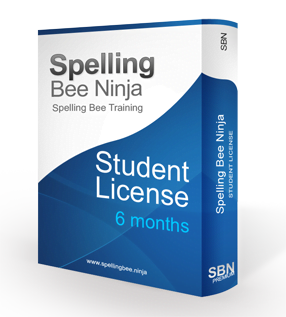In this tutorial we will introduce some essentials rules and techniques to learn how to spell.
Spelling words or terms of the English language has always been a complicated matter for individuals trying to learn English language.
While the English language vocabulary continues to grow every day, the origin of English words includes almost all language in existence some of which are no longer regularly spoken!
Most identical sounds are spelled differently as different words and out of 90 basic English spelling patterns 84 spelling patterns have exceptions.
It’s no surprise that spelling bee can be a competitive event and learn how to spell it’s a serious challenge of the modern student.
Spelling events have been in existence for more than a decade.
Nevertheless, there has been a dramatic increase in the level of attention given to spelling events in the last few years and in 2006 for the very first time live television coverage of the spelling event was shown during prime time.
‘A lot of it is luck, to be quite honest,’ says the 2006 winner ‘Kerry Close’, now a 23-year-old reporter at Money-Magazine. ‘There’s maybe a dozen or more kids who have a realistic shot of winning,’ says Close. ‘Wining actually comes down to who’s asked the right word.’ To prepare for her moment in the spot-light, Close memorized over 30,000 words, and she says she was only familiar with 3-quarter of the words she faced in the competition. According to the rules of the game, if a contestant is unfamiliar with a word, he or she is allowed to ask for more information about the word, including its definition, other pronunciations and language of origin.
Unlike Japanese and Spanish, with regular patterns of spelling and pronunciation, English language as we know it is a hodgepodge of words, a Frankenstein of languages from Greek, French, German, and Latin.
Close points to words with Greek and Latin roots as especially tricky. ‘There’s a lot of rules in Greek and Latin,’ she says, ‘Many of which are broken.’ Although it might be tempting for competitors to go for an obscure lettering, says Close, the most effective strategy is however to guess the simplest answer in most cases.
How to Spell Difficult Words
You may never be a spelling bee competitor confronted with a word or term like “Pneumonoultramicroscopicsilicovolcanoconiosis,” still you’ll probably encounter difficult words that you’ll need to spell accurately on a daily basis. Although we have handy tools like spell-check, yet nothing that can replace a good personal spelling skill when trying to communicate with others. It could mean the difference between looking informed and careless or professional and inexpert. With more dedication, research, and practice, you can figure-out how to spell even the most difficult words.
First separate the word into chunks and slowly repeat the word out loud. Carefully sound out each part, one syllable at a time. Splitting words into manageable parts helps focus on the spelling of each individual part, which makes it easier when putting the whole thing together.
Endeavor to write the word down syllable by syllable even as you pronounce. For instance, when you split ‘aristocratic,’ it now becomes ‘a – ris – to – cra – tic.’ ‘Repetition’ would be parsed-out as ‘re – pe – ti – tion,’ and ‘ridiculously’ becomes ‘ri – di – cu – lous – ly.’
Start from a simpler form of the word. Most words are tricky to spell because they’re derivations of less complicated words. Thinking about the root of a complex word, can give you a good view on how to figure out the rest.
So, the easiest way to identify the root of a word is to remove any suffixes (such as “-tion,” “-ly,” “-ment,” “-or,” “-less” “-like,” or “-ing,”) or prefixes (like “inter-” “mis-,” “im-,” “pre-,” “re-,” or “un-,”) that may be attached to it.
Example, if you’re having trouble with the word “restructuring,” take away the prefix ‘re’ and suffix ‘-ing’ to get to the basic form of the word ‘structure.’ ‘Disconnection’ would be simplified to the prefix ‘dis’ plus the root ‘connect’ and suffix ‘-tion.’
Note that the last letter of a word’s root is often changed when combining it with suffixes to avoid overlapping, or repeated vowels and consonants. For instance, ‘disconnection’ doesn’t have two (t)’s and ‘restructuring’ drops the (e) from the root ‘structure’ to accommodate the suffix ‘ing.’
Also, draw on common spelling rules. When a word is difficult to pronounce, it may yet follow a standard-pattern of English that you may apply as a rule.
For example, a common rule like this (‘I’ before ‘e’ except after ‘c’) can help in figuring out that words with an ‘ee’ vowel sound will be spelled as “shield” (‘I’ before ‘e’) and ‘receive’ (except after ‘c’).
Another common spelling rule is that when adding a suffix to an English word ending with an ‘e,’ you generally drop the ‘e’ that starts with a vowel (like ‘-ing’ or ‘-able’) and keep it when adding a suffix starting with a consonant (like ‘-ment’ or ‘-ly’). Using this rule, you can figure-out that ‘homeless’ and ‘homely’ will both keep the ‘e’ at the end of ‘home’ while ‘moving’ and ‘unmovable’ will both drop the ‘e’ from ‘move.’
For sure the first ingredient to learn how to spell and succeed in spelling bee competitions is the hard work. Nevertheless the right tools can help a student in dramatically improve spelling skills in a relative short time.
Check out our Spelling Bee Practice Tutorial , a reference guide containing the best practices to improve your spelling quickly and effectively.
Moreover we offer you some top notch tools in this sense:
Get Spelling Bee Ninja
 Get a Spelling Bee Ninja account: our professional spelling bee training system.
Get a Spelling Bee Ninja account: our professional spelling bee training system.
Using this system for a little while will turn you to a Spelling Bee champion.


